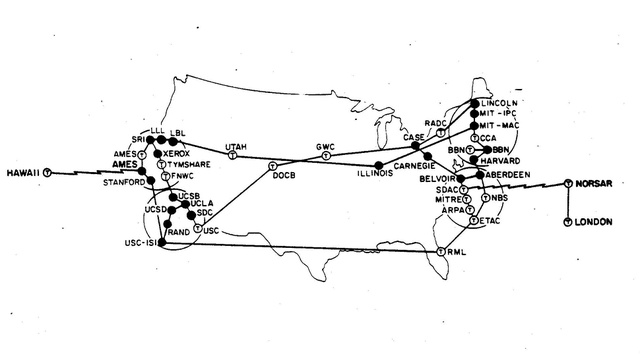人们对网络的不信任在因特网出现之前就存在
来源:互联网新闻 时间:2020-05-02 12:03
新华网12月11日电 据美国科技博客Gizmodo报道,最近的泄密事件证实我们在互联网上的一举一动都受到监控,人们对互联网的信任度达到历史新低。事实上,如果我们看看这篇1973年发表的文章就会知道,早在因特网出现之前,人们就已经意识到我们这个相互连通的世界的基础是对隐私和安全的信任。

图片来源:《ARPANET完成报告》
《基督教科学箴言报》1973年的一篇文章(这篇文章当时被广泛转载)讨论了当时的新型网络——ARPANET。这是现代互联网的先驱,到现在还受到政府的监管。在1973年,ARPANET只对研究人员和政府机构开放,直到上世纪80年代末90年代初骨干网络私有化之前,这一规则一直适用。
1973年的这篇文章预测未来会有很多网上银行、高科技图书馆和世界范围内的通讯——但如果人们认为他们的隐私受到侵犯,这一切都会遭遇惨败。
下面是1973年1月30日艾奥瓦州《德梅因纪事报》转载时的一段摘录,文章标题为《新型计算机网络带来革命性的未来》。
专家表示,一个新研发的计算机通讯网络会给未来带来革命性的改变。普通公民可以打开电脑来获得建议,或者从银行账户取钱。
通过出口美国的知识和技能,这一系统还会帮助美国实现贸易平衡。
在复杂的商业网络建成后,电脑服务的价钱会下降2/3,国防部高级研究计划局(ARPA)的劳伦斯·罗伯特博士说。高级研究计划局开发的这个系统名为Arpanet,可以通过新的方式把电脑连接到一起,方便人们更有效率地使用大型计算机的功能。
许多人对这个系统可能对安全和个人隐私造成威胁表示忧虑。但是Arpanet的工作人员认为这些问题可以得到解决,而且如果从一开始就考虑这个问题,那么解决成本也不会非常高。
5年后,银行会使用内部网络连接起来,这样人们就可以在世界任何一个地方提取现金。图书馆的借书系统会大大扩展。大量的书面工作会通过电脑进行存储和传输。
“美国的潜力将不再是钢铁和其他硬商品,而是思想,”罗伯特博士说。
在过去10个月里,网络流量已经增加了10多倍。
在上世纪90年代,商用网络面临的最大问题是信任,但和现在这个“后斯诺登时代”我们想到的信任问题不太一样。当时的普通人意识到这个刚刚私有化的网络具有极大的潜力,但他们怎么可能会把自己的信用卡号码放到网上去呢?他们怎么知道和他们联系的人使用了真实的身份呢?
在21世纪的前10年,人们花了好几年才建立起这种信任。现在,人们上网买东西不会有任何迟疑。我们还在云端存储了大量私人信息。
现在我们看到这种信任正在被瓦解,因此人们的网络行为也正在发生变化。信任对未来的因特网至关重要,就像在1973年一样重要。我们早已经被前辈们警告过了。
译者:林杉
百度新闻与新华网国际频道合作稿件,转载请注明出处。
People Didn\'t Trust the Internet Before There Even Was One
Thanks to recent confirmation that your every online move is being monitored, trust in the internet seems like it\'s at an all-time low. In fact, as we can see from an article published in 1973, we were acutely aware that the future of our interconnected world depended on confidence in the privacy and security of the network before it even existed.
The Christian Science Monitor published an article in 1973 (which then appeared in various newspapers around the country) that looked at the potential for this new network called the ARPANET. The network was the precursor to our modern internet and was still overseen by the government. In 1973 the ARPANET was only officially open to researchers and government agencies, a policy that remained intact until the privatization of the backbone network that occurred in the late \'80s and early \'90s.
The 1973 article predicts a future filled with online banking, high-tech libraries, and worldwide communication—all activities that would fail miserably if people didn\'t trust that they had some semblance of privacy.
Below is an excerpt of what was published in the January 30, 1973 edition of the Des Moines Register in Iowa under the headline, "New Computer Network May Revolutionize the Future." Emphasis mine.
A newly developed computer communications network may revolutionize the future, experts say. The average citizen may be able to call up a computer which will instruct him or give him money from his bank account.
And the system may help the United State\'s balance of trade by providing an international market for U.S. know-how.
When extensive commercial networks are established, computer service costs may be cut by two-thirds, says Dr. Lawrence Roberts of the Advanced Research Projects Agency (ARPA) of the Department of Defense. The system, developed by ARPA and called Arpanet, will enable many more people efficiently to use capabilities of the largest computers in the nation by linking the computers together in new ways.
Many people are concerned about the threat that these systems may present to security and individual privacy. But those working on Arpanet feel these problems can be solved, and the solutions may not be very expensive if they are only taken into consideration from the very beginning.
Five years from now banks may be interlinked so an individual will be able to draw on his private account from anyplace in the world. Lending systems between libraries may be greatly expanded. Reams of paper work may be stored and transmitted by computer.
"The potential of the United States is no longer in steel and hard commodities but in ideas," says Dr. Roberts.
In the last 10 months the amount of traffic on the net has increased tenfold.
One of the biggest challenges facing the commercial internet in the 1990s was a lack of trust. But it was a slightly different kind of trust than we often think about today, in a post-Snowden world. Average people of the 1990s were discovering that this newly privatized network had enormous potential. But how could they trust the internet with their credit card numbers? How could they know that the people they were interacting with were who they said they are?
It took years to establish the kind of trust in the internet that evolved in the first decade of the 21st century. Today, most people don\'t think twice about buying things online. For the most part, we trust cloud services with our private data.
We now see much of that trust now eroding. And people are beginning to change their online behavior as a result. Trust is essential to the future of the internet, just as it was in 1973. We can\'t say we weren\'t warned.
Image: ARPANET map from 1973 from the ARPANET Completion Report, Bolt, Beranek and Newman, Burlington, MA, January 4, 1978 via ARPANET Maps Online
纽约股市三大股指10日下跌罕见暴风雪袭美致多地政府学校关门 逾10日美元对主要货币汇率下跌肯尼亚北部城市袭击事件致8人死亡罕见暴风雪袭美致多地政府学校关门 逾他唤醒我们心中最美好的部分普京给俄罗斯媒体做大手术 官媒将对西普京给俄罗斯媒体做大手术 官媒将对西罕见暴风雪袭美致多地政府学校关门 逾媒体再曝斯诺登文件:加拿大应美国要求追悼会的规格,看这些人的名字普京给俄罗斯媒体做大手术 官媒将对西世行行长称赞中国经济改革举措美国10月计划招聘就业岗位数环比增加美国10月份批发库存环比上升1.4%安理会决定维持对利比里亚的部分制裁措国际货币基金组织下调明年俄罗斯经济增世界银行预测肯尼亚2013年经济增长在也门遭绑架的荷兰夫妇获释媒体再曝斯诺登文件:加拿大应美国要求法军在马里北部打死19名武装分子日寻求构筑日中海上联络机制上海杀婴案嫌疑人被批捕 伯母供认作案俄国家杜马呼吁乌克兰和平解决国内问题“自由路不易”:各国领导人与南非民众伦敦股市股指10日下跌0.55%伦敦金属交易所基本金属期货价10日普两名西班牙记者在叙利亚遭绑架 家属呼两名西班牙记者在叙利亚遭绑架 家属呼立陶宛总统赴希腊移交欧盟轮值主席国权自然界10大最可怕“吸血鬼”国防部谈东海防空识别区:个别国家不通秦刚:日方到处煽风点火别有用心摔倒太婆每次受访均下跪喊冤 律师听其是爱国还是误国?日本教科书又要闹哪样研究称接吻有助人类评价潜在配偶及维持印度火车脱轨致2人死亡 25人受伤李克强“经济公开课”10个瞬间:稳增温州28岁IT小伙兼职做网店 半夜工习近平“现身”中南大学 大学生欢呼雀港媒:中国小偷泰国免税店内行窃后坐飞外交部:国际社会应尽早制定网络空间行也门一男子烧死15岁女儿 只因其与未秘鲁前总统出院后重返监狱 曾被判25伊朗和英国将重开驻对方使馆 两周内互韩国女子整容整出\"漫画脸\" 主动小学停课成群众安置点 社区书记驱车1\"菲特 \"逼近 浙江农家乐 1.日本大阪一文物保管处被烧 或系人为故By2台北发行新专辑 穿性感迷你裙大